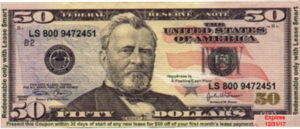What’s The Rate?
(We get asked this question.)
(This is a true story.)
Billy, who owns several western wear and saddlery stores called to have us write another lease for him. We’ve done lease business together before, but this time Billy was insistent that we provide a percentage rate to him before he would sign our lease documents. This came up because the equipment vendor had offered Billy a lease that they called “6.5% Prime” and he wanted to know what our rate was. Equipment leasing professionals hesitate to get into making percentage calculations because … … well, there are lots of reasons …
We are reluctant to express lease terms as percentage rates because we believe it to be a disservice to our customers to have them think of their lease transaction as being the same as finance contracts, even when they are structured as a ‘full payout’ lease (with a fixed residual). Certainly, there are elements of a lease transaction which are similar to a term loan, but there are also many ways a term loan differs (including but not limited to ‘compensating balances’ required by bank lenders, transaction fees, tax treatment, fixed vs. floating rate, simplified accounting, etc.). We feel it is misleading to try an ‘apples-to-apples’ comparison to any bank loan or non-lease finance contract.
We also prefer to avoid the ‘rate’ issue because – from a business standpoint – it requires a long and complicated explanation (as you’ll see here) and it seldom satisfies the person making the inquiry. Even when we give our customer an answer, we have to present it with disclaimers galore. We sincerely and earnestly advise our clients to DOUBT or view with suspicion, distrust and skepticism the accuracy of any equipment lease quote that is presented in terms of an Annual Percentage Rate. The person who quotes an interest rate on a lease has just chosen a convenient answer – a half-truth at best.
Instead, we recommend that our clients compare our lease transaction to any other lease, and be sure that all aspects of the compared transactions are presented in an identical fashion. Changing the total amount of payments due at inception, for instance, causes a change in either the payment amount or the effective % rate or both. The fact that you have given up more (or less) of your cash at the start of one proposed lease than you would on another cannot be ignored in an apples-to-apples comparison. That’s just one example.
We always recommend that our clients review their lease quotes with their accountants when they have ‘rate’ questions because we know there are too many ways to make a percentage ‘rate’ calculation with a very wide spread in the resulting answers.
Using just the one set of terms we quoted to Billy we calculated a result that worked out to only 6.66%.
We could also calculate – using the SAME SET OF TERMS – a rate that worked out at 24.99%!
Neither of those rates should be believed, because they were calculated with faulty assumptions!
We know of at least 21 different methods to calculate a ‘rate’ on any particular set of lease terms – with 21 different resulting answers!
Billy’s accountant might calculate something entirely different from how we would calculate it, but at least his accountant could be expected to consistently use the same method of calculation in comparing multiple lease proposals.
Too often, the ‘large print’ terms are the only issue compared, but it is in the fine print of the contract that the significant differences lie. For instance:
- Is there an “interim” or fractional month that will be charged at the start of the lease (i.e.: extra days of charges before the ‘start’ of the regular billing cycle)? Many leases allow for an “interim rental” charge, turning a 36-month lease into 36.9 months (and charging for the extra 27 days!).
- Will there be a “termination fee” assessed at the end of the lease, IN ADDITION TO your stated FMV or 10% or $1.00 residual? We’ve seen leases that provide for a termination fee of 2%+. Ouch! (Note: Always INSIST on getting the residual agreement in writing, countersigned by the Lessor!)
- Will you be charged additional fees during the term of the lease for the accounting and billing of personal property taxes? And will you be charged personal property taxes based on the actual amount of those taxes or based on the leasing company’s (ahem) estimate? Guess how they’ll estimate your taxes if you let them!
- Does the lease have an onerous late payment/late charge policy? A lease document which provides for -0- days of ‘grace period’ and a 25% late payment penalty could have a slightly lower monthly payment than the alternative lease which has a 10-day grace period and an 8% late payment penalty.
It goes without saying that lease rates will be different on different terms, with different collateral or with different guarantors and credit circumstances. Lease $mart takes each applicant’s strengths and weaknesses are into consideration in determining what are the best approval terms – weighing all aspects – that can be provided on any particular transaction.
These are complicated matters which should be entered into only with trustworthy people trust. Your business insurance broker or agent probably knows more about what is in your best interests relative to insurance than you could digest without getting a headache. Your accountant and your real estate advisors probably have more knowledge about their respective industries than you need to know. In these complex issues, you need to know that your advisors know and that you can confidently trust them.
If I’m shopping for a saddle at Billy’s saddlery store, I want to know:
- that they know more about saddles than I do; AND
- that they are people of integrity who are interested in my long-term business relationship.
As leasing professionals, it is our responsibility to ask enough questions to understand each client’s circumstances; to know about the subtleties of how lease agreements can be drafted; to present the best possible approval to each client and to help our clients to make informed decisions about the transaction at hand.
The CLP (Certified Leasing Professional) initials after my name provide assurance that I have substantial industry experience (25 years!), have passed a rigorous exam and have pledged to uphold the highest Standards of Professional Conduct and fair dealings with all parties. Lease $mart is also a member of both the National Association of Equipment Leasing Brokers (with its own strict code of ethics – click on the logo below) and the Better Business Bureau. Our entire staff is dedicated to the same standard of professionalism.
We are always pleased to discuss and explain the rate issue and answer our customers’ other questions about leases and leasing. We ARE “Lease $mart” and we consider it our mission to help our clients to make informed decisions about these financial matters.
► By the way: Lease $mart’s lease payment on Billy’s lease was more than $200/month lower than the payment on the vendor’s so-called ‘6.5% prime’ lease. And YES: Billy let us write the lease for him!
If you torture data sufficiently, it will confess to almost anything.
Fred Menger, chemistry professor (1937 – )
We welcome the opportunity to quote a specific lease payment amount for you on any transaction. For the reasons stated above, we will ask you several questions before we can give you an accurate and reliable answer.
If you’re going to be comparing lease rates from one leasing company to another, be sure to keep your focus on dollars and cents. Be very careful about trying to compare “percentage rates” between Lessors unless you are able to make that calculation yourself. (Not all Lessors will use the same method or formula for calculating a “percentage rate.”)
And make sure that the Lessor puts everything you compared about the transaction in writing before you commit to any specific lease or Lessor. It’s just good business to do so!

Congratulations! You found our “Lease Rates Coupon”! Print and present this coupon within 30 days of completion of any lease for $50 off your first month’s payment. Limit: One coupon per transaction.

